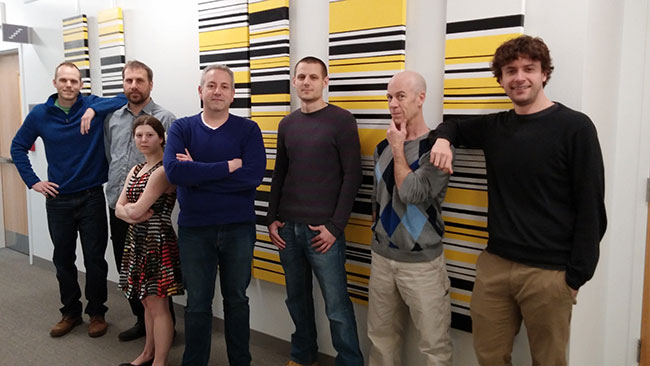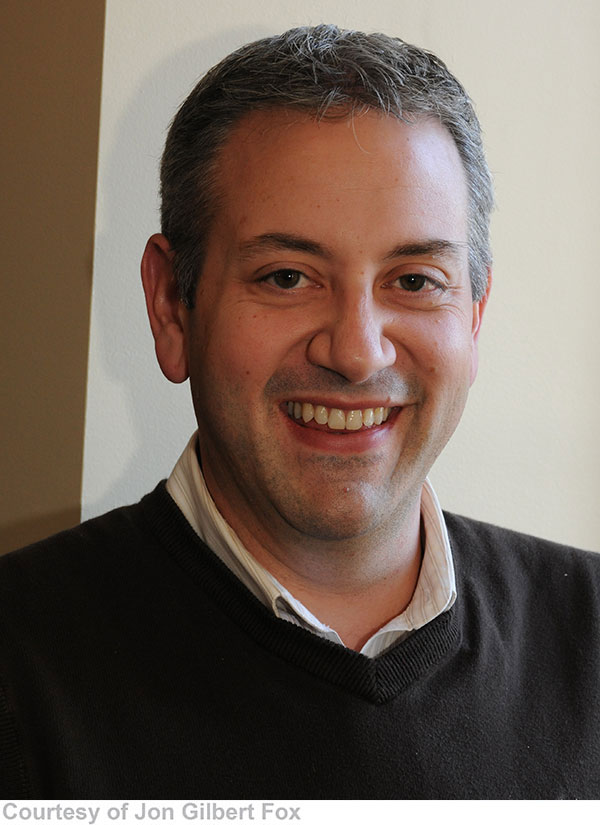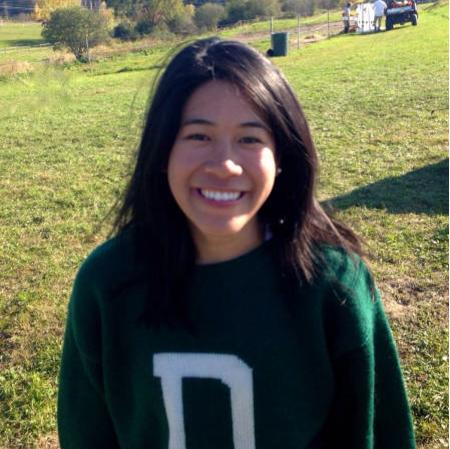Current Lab Members

 Carmen J. Marsit, PhD
Carmen J. Marsit, PhD
Assistant Professor
Pharmacology and Toxicology
Community and Family Medicine, Section of Biostatistics and Epidemiology
Carmen joined the faculty at the Geisel School of Medicine at Dartmouth in 2011. Prior to Dartmouth, Carmen was an assistant professor in the Departments of Pathology and Laboratory Medicine and Community Health (Epidemiology) at Brown University. He holds a Bachelor of Science degree in Biochemistry from Lafayette College, and a PhD in the Biological Sciences in Public Health, focused on Cancer Biology, from Harvard University. Carmen was a post-doctoral fellow at the Harvard School of Public Health, where he gained training and interest in molecular epidemiology and epigenetics in cancer. During his postdoctoral training, he began his studies of DNA methylation alterations and variation in bladder cancer working with Dr. Karl Kelsey and Dr. Margaret Karagas here at Dartmouth, considering not their role in disease etiology but also their clinical importance as biomarkers of risk or prognosis. At Brown, he expanded his research program to examine the importance of epigenetic regulation in human development and the importance of the intrauterine environment on human health, focusing on mental health. He has successfully designed and executed the Rhode Island Child Health Study, a population-base birth cohort designed to examine the impact of placental epigenetic variation on early life neurobehavioral and other health outcome. He continues to expand his work on the role of epigenetic mechanisms including DNA methylation and microRNA expression in the developmental origins of health and disease, as well as aiming to expand his work on bladder cancer epigenetics to the clinical setting. Carmen lives in the Upper Valley with his husband, Kevin, a kitchen designer, and their schnoodle, Brody.
 David Armstrong
David Armstrong
Lab Manager
A native of Boston, MA , I moved to the Dartmouth-Area in 2003. Several generations removed, I still have deep roots in this area (Norwich, VT) that date back to the early 1700's. It's clear to see why my family chose to call the beautiful Upper Valley Area their home. My earlier research days included work with Tom Hamilton at the Cleveland Clinic investigating the molecular events that control the expression of inducible genes during inflammation and the cell biology of chemokines, in the settings of renal cell carcinoma and wound healing.
More recently, I've worked at the VA Medical Center in White River Junction, VT, with Matthew Vincenti studying the basic mechanisms in the regulation of matrix metalloproteinases in the settings of osteoarthritis and lung cancer.
I'm currently involved in a number of projects including:
a) Global and gene-specific DNA methylation in paired tissues from newborns to determine the extent that these tissues could serve as surrogates for one another or whether the epigenetic marks of each tissue needs to be considered individually due to each tissue's own unique epigenetic signature and if so, is this likely to reflect differential functions.
b) MicroRNA profiling in bladder cancer - we are examining the microRNA content in bladder cancer tumors and matched urine exosomes as a potential diagnostic and prognostic non-invasive biomarker for early stage bladder cancer.
c) Mitochondrial genome methylation - investigating how methylation of mitochondrial DNA may be associated with environmental exposures and early life neurobehavioral outcomes.
When I'm not feeding cells, I enjoy spending time with my family, hiking, coaching-playing-watching baseball and softball, downhill skiing, swimming, listening to my local Beethoven and climbing stairs. My favorite number is 5, favorite baseball player is Omar Vizquel, movie is Field of Dreams and favorite song is American Pie by Don McLean. Definitely a DOG person.
 Dylan Guerin - Research Assistant
Dylan Guerin - Research Assistant
I'm involved in several projects in the Marsit Lab centered around the Rhode Island Child Health Study. My work in one area is focused on examining the relationship between global DNA methylation variation in the placenta and infant neurodevelopmental outcomes. Additionally, I'm working on upstream tissue processing in support of a project for examining alterations to gene imprinting in the placenta and possible relationships to metals exposure and neurodevelopmental outcomes in these infants. This project aims to identify epigenetic biomarkers in an accessible tissue at birth that predicts altered neurodevelopmental trajectories. Such biomarkers may have significant clinical and public health impact, providing an opportunity for early interventions for at-risk children, and potentially identifying novel paths for prevention and treatment.
Born in Lebanon, I have lived in the Dartmouth area my whole life. I graduated from the University of New England in 2013 with a Bachelors of Science in Biochemistry. I joined the Marsit lab recently after graduating and am excited to be part of the Dartmouth community. When not in the lab I enjoy reading, playing video games, hiking, playing soccer, and spending time with my pets.
 Benjamin Green
Benjamin Green
I am originally from Kingston, MA and completed my undergraduate work at Colby College in Waterville, ME where I studied Biology. Following my time in Maine, I began pursuit of a Ph.D. in Animal Sciences from the University of Vermont. My studies there focused on determining the causes of inter-animal variation in innate immunity of dairy cattle in addition to the developmental mechanisms of this response. My work specifically investigated the role of DNA methylation on gene expression following an immune challenge. My interests in the role of epigenetic factors on disease brought me to the Marsit lab at Dartmouth to continue working on the developmental origins of health and disease. My current project here will involve working with genome wide methylation data to determine the link between environmental exposures in utero and developmental alterations leading to alterations in childhood behavior. When not in the lab I enjoy getting outside whenever New England weather allows to either bike or hike and enjoy all this region has to offer. In addition I enjoy watching the Red Sox, Patriots, and Bruins as well as a good cup of coffee.
 Jeffery Thompson
Jeffery Thompson
I'm originally from western Maine and prior to 2010 spent almost 15 years in the health publishing industry. As a person with Celiac Disease, I have a strong interest in connecting people with information that can improve their lives and I created a company that enabled shoppers to find safe products in the store to eat, with a combination of apps for smart phones, PDAs (remember those?), and books.
Eventually, the food industry took notice and started to supply the information themselves and now it is relatively easy for people with Celiac Disease to shop for safe food to eat.
I needed a new project, so I went back to school and graduated from the University of Southern Maine with a degree in computer science. I was immediately drawn to research during my undergraduate work and joined the Congdon lab, where I developed a machine learning approach to inferring cis-regulatory modules of transcription factor binding sites. This research led me to become interested in all pre- and post-transcriptional regulation of genes and to notice that epigenetic data are underutilized by many projects that seek to unravel disease etiology.
I joined the Quantitative Biomedical Sciences (QBS) PhD program at Dartmouth because of its vision of a new type of researcher that can help connect specialists in different areas (epidemiology, biostatistics, and bioinformatics) to solve these types of problems, by being highly cross-trained. In the Marsit Epigenetics Lab I am developing new tools that enable integrative analyses of multiple, high-dimensional datasets using machine learning to reveal the connections between environmental exposure, epigenetic control, gene expression, and disease.
When I'm not working, I like to take my family kayaking, sailing, and hiking in the beautiful Upper Valley.
 Julia Litzky
Julia Litzky
I grew up outside of Annapolis, MD and did my undergrad at Hamilton College. There, I majored in Neuroscience and minored in Philosophy. At Hamilton, I did research in the Lehman lab on drosophila tyrosine beta-hydroxylase protein expression. Over the summers, I worked in the Quinones-Hinojosa lab at Johns Hopkins studying the migrational characteristics of glioblastoma multiforme brain tumor stem cells in comparison with fetal brain cells and in relation to Slit proteins.
From Hamilton, I entered the MD/PhD program at Dartmouth, and am now embarking on my PhD years in the Marsit lab! Clinically, I'm interested in prenatal neurodevelopment and the hormonal and environmental factors that contribute to making us who we are once we're born. I hope to pursue a career in research science in neonatology or maternal fetal medicine.
In my free time, I enjoy baking, reading, spending time hiking with my dog, Byron. I am also an avid Bikram Yogini. I also volunteer as an advocate for Wise (the local organization for victims of domestic abuse, sexual assault, and stalking) by helping to staff their 24-hour crisis hotline. Additionally, I volunteer with Geisel's Art for Kids/Faces of Art in the pediatric craniofacial clinic at DHMC, which works to bring the expressivity and fun of art into the clinic to take some of the stress out of going to the doctor. I'm also a co-leader of the Geisel chapter of Medical Students for Choice, which works to bring education regarding family planning and abortion to medical students, and an editor of Lifelines, Geisel's literary journal.
 Megan Murphy
Megan Murphy
Though I am an Upper Valley native, I took a 13-year sabbatical from the region before returning to join the group at Dartmouth. As an undergraduate student I studied Chemical Engineering (McGill University, Montreal, QC); I practiced engineering in the biotech/pharma industry for a few years before shifting to a more research-focuses career. Much of my industrial experience was directed at the development of processes for manufacturing cancer therapeutics. I moved away from industrial work after obtaining my Master's degree in Biostatistics (Columbia University, New York, NY) but maintained a continued interest in cancer outcomes. While working with the National Cancer Institute (Bethesda, MD) I developed a stronger curiosity for research and honed my energies on the epidemiology of female reproductive cancer, particularly ovarian cancers. I continued work in this area while obtaining another Master's degree in Epidemiology (Harvard University, Cambridge, MA), but also developed interest in reproductive epidemiology on a whole. My family and my longing for another stint in Vermont brought me back to the region, and to Dartmouth, in 2012. At Dartmouth, I provide a range of statistical support for the Marsit Lab and for other groups in the Cancer Center. At home, I enjoy spending time with my family; hiking, running and climbing; keeping a strong yoga practice; and working on house and yard projects.
 Todd Everson
Todd Everson
My academic path has taken me across the country, obtaining my BS from Colorado State University, MPH from Oregon Health and Science University, and PhD from University of South Carolina. Throughout my different academic stops, I have been involved in many different research areas including liver disease, injury/trauma, and environmental health. I found all of these topics both important and interesting, but my work in epigenetic epidemiology captivated me the most. At USC I worked with researchers involved in the Isle of Wight birth cohort, studying the role that DNA methylation plays in complex diseases such as allergy and asthma. Now I'm continuing my work in epigenetic epidemiology at the Marsit Lab. I am particularly interested in exploring how environmental exposures can alter the epigenetic landscape, determining whether those alterations result in physiologic changes, and whether those changes can yield new insights into early life health outcomes. I will be investigating these topics within the Rhode Island Child Health Study and the New Hampshire Birth Cohort.
When I'm not busy crunching the numbers and writing manuscripts, I enjoy playing piano, hiking or running the local trails, and trying my hand at home-brewing mead, beer, and wine (results are highly variable). I'm looking forward to exploring the White and Green Mountains in the summers and snowboarding and cross-country skiing in the winters.
Undergrads
 Bailey Blair
Bailey Blair
Bailey is from Bucksport, Maine and attends Franklin Pierce University in Rindge, NH, where she studies Biology and Mathematics. She is a summer intern in the Marsit Lab during 2015 as a member of the New Hampshire IDEA Network of Biomedical Research Excellence Program (NH-INBRE /ISURF). Bailey's project, primarily analyzing changes in DNA methylation via bisulfite pyrosequencing, focuses on the effects of methylation on the mitochondrial genome, associations with environmental exposures and early childhood development outcomes.
In her free time she enjoys playing and watching sports, especially softball, and spending time outdoors and activities including kayaking and hiking.
 Dan Gorman
Dan Gorman
Dan is a native of Hanover and currently majoring in Government as a member of the Dartmouth College Class of 2016. He began working in the Marsit Lab in December of 2013. Looking ahead, he hopes to attend medical school after graduating from Dartmouth. Outside of the classroom, Dan plays wide receiver for the football team and enjoys traveling. Most recently he had the opportunity to backpack through Thailand and Cambodia for a few weeks in the winter of 2014.
Esteemed Alumni
 Corina Lesseur-Perez M.D., Ph.D.
Corina Lesseur-Perez M.D., Ph.D.
Dr. Corina Lesseur is a Postdoctoral Fellow at the International Agency for Research on Cancer in Lyon France. She moved to Europe after receiving my PhD from Dartmouth in June 2014 under Dr. Marsit's mentorship. At the Marsit Lab, her thesis work focused on the epigenetic status of leptin, an important adipokine that also has roles in development. Presently, Corina is working in genetic epidemiology of head and neck cancers in a large population study. Although the current work is in a different disease, she frequently uses molecular epidemiology tools acquired at the Marsit Lab and still collaborates with Dr. Marsit in projects related to the maternal metabolic status influence on the placental epigenome. Her long term career goal is to continue working in molecular epidemiology, where she can integrate laboratory and analytical tools to obtain knowledge of molecular biomarkers of disease at the population level, to identify individuals at risk and hopefully contribute to disease prevention.
 Alison G. Paquette, Ph.D.
Alison G. Paquette, Ph.D.
Under Dr. Marsit's mentorship, I studied how the placental epigenome contributes to infant neurobehavioral outcomes, which act as a projection of long-term mental health. My thesis research combined both candidate gene and genome wide approaches to identify epigenetic variation associated with neurobehavioral outcomes in newborns. Placental serotonin and cortisol play significant roles in infant development, so I have studied methylation patterns of genes involved in these pathways and their association with infant health outcomes. I have also identified genes that are differentially methylated across the genome in association with poor motor control and cognitive outcomes. Altogether, my thesis research has contributed to our understanding of how epigenetic regulation of the key genes in the placenta relate to neurobehavioral outcomes in newborns, which may someday be used as novel molecular diagnostic tools to identify at risk infants, or translated into targets for therapeutic intervention.
I am currently a post doc working with Dr. Nathan Price at the Institute of Systems Biology in Seattle Washington. I am learning to apply my data analysis skills to identify molecular biomarkers that may predict preterm birth and adverse neonatal outcomes such as preeclampsia. When not in lab I find myself drawn to the mountains, so you can find me rock climbing, hiking, or kayaking.
 Devin Koestler, Ph.D.
Devin Koestler, Ph.D.
Dr. Koestler is an Assistant Professor in the Department of Biostatistics at the University of Kansas, School of Medicine. He received his PhD in Biostatistics from Brown University and completed his postdoctoral research training in the Quantitative Biosciences (QBS) program at the Geisel School of Medicine at Dartmouth College. His primary research involves the development and application of statistical methodologies for high-throughput 'omics' data; in particular, array-based DNA methylation data. During his graduate work, Dr. Koestler was awarded an NIH F-31 doctoral dissertation fellowship to develop model-based clustering methodologies for high-dimensional genomic data. This work has served as the foundation for much of his ongoing research and forms the analytical basis for a number of ongoing research projects in the Marsit Lab. From a methodological standpoint, Dr. Koestler is interested statistical genomics, multivariate statistics, mixture models, and mixed effects models. Additionally, he has a deeply rooted interest in epigenetics and molecular epidemiology, specifically DNA methylation and its implications for human health and disease. Dr. Koestler continues to collaborate with the Marsit Lab on a wide spectrum of projects, including: the role of in-utero exposure to environmental toxicants on the epigenome of developing infants and the discovery/validation of DNA methylation-based biomarkers for predicting disease risk and prognosis.
 Allison Appleton
Allison Appleton
Dr. Allison Appleton is an Assistant Professor at the University at Albany (SUNY) School of Public Health, in the department of Epidemiology and Biostatistics. She received a Doctor of Science degree from the Harvard School of Public Health in Social Epidemiology and Maternal and Child Health and completed a postdoctoral fellowship in Cardiovascular Epidemiology, also at Harvard. Dr. Appleton joined the Marsit lab as a postdoctoral research fellow in the Quantitative Biomedical Sciences training program to gain expertise in genomic and epigenomic biomarkers of disease. Dr. Appleton's work follows a developmental origins of disease framework where exposures occurring during the earliest and most sensitive periods of human development have significant consequences for disease risk over the life course. Dr. Appleton continues to collaborate with Marsit Lab colleagues in studying the association of DNA methylation of genes involved in the stress response and infant neurodevelopment, and whether such associations are patterned according to maternal experiences of social and psychological adversity.
 Christine Miguel
Christine Miguel
Christine, after having graduated in June 2014 with a BA in Women and Gender Studies Major and as a pre-health student, moved back to New York, where she plans on studying for the MCAT and working at Weill Cornell Medical College as a Senior Patient Coordinator. While she is looking forward to having more down-time and energy to read leisurely, develop her love for writing, and travel, she still plans on doing work towards combating social and health disparities and maintaining her work as a Dartmouth GRID fellow. After two years of work and volunteering experience abroad, she hopes to attend medical school with an already developed interest in social medicine and primary care.
 Chelsye Nelson
Chelsye Nelson
Chelsye graduated from Dartmouth College in June 2014 with a degree in history. She is currently serving as a research fellow at the National Institutes of Health after being selected for the Postbaccalaureate Intramural Research Training Award program. She will spend the next year working with Dr. Les Folio in the radiology department of the NIH Clinical Center. Following her time at the NIH, she is planning on applying to medical school.
 Lauren Kwan
Lauren Kwan
Lauren, who started in the Marsit Lab in November 2012, graduated magna cum laude with a BA in Anthropology Modified with Economics from Dartmouth College in May 2014. She was awarded the Robert A. McKennan Prize in Anthropology and was the IHSA Zone 1, Region 2 Walk-Trot champion as part of Dartmouth's varsity equestrian team. Lauren is currently serving as a Dartmouth Lombard Fellow at the Women's Community Clinic in San Francisco, CA, working in health education and outreach. In 2015, following a month long hiking trip through Europe, Lauren will be attending Ohio State University, College of Medicine in Columbus, OH.
 Roshen John
Roshen John
I am an upstate New York native, and currently studying human biology with a minor in public policy here at Dartmouth College. I joined Dr. Marsit's lab in June 2012, fascinated by the lab's research of epigenetic regulation and its neurobehavioral implications. In my free time, I love to run (the Upper Valley is perfect for this!), play tennis, and rock out on the piano. I hope to practice medicine in the future, while maintaining involvement in both research and health policy work in some capacity.
 Ashlee Roberson
Ashlee Roberson